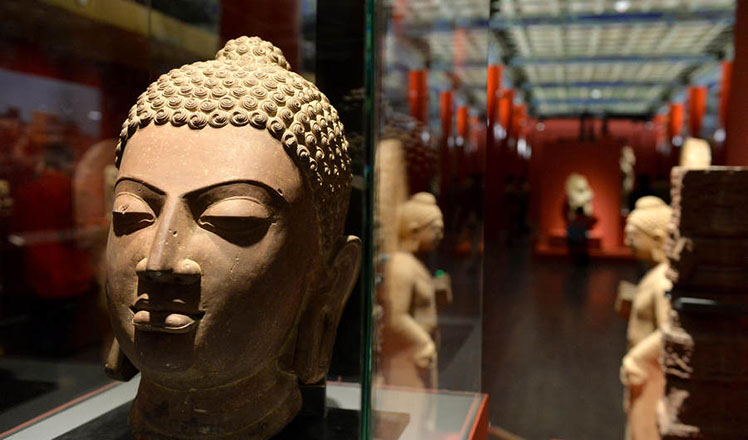China, US navies work on relations
Updated: 2016-10-04 11:14
By Chen Weihua in Washington(China Daily USA)
|
||||||||
The US' top naval official has assured the public of the improving mechanism between the US and China to prevent any conflict at sea.
Admiral John Richardson, chief of naval operations, talked about China's anti-access and area-denial strategy, known as A2/AD, and the situation in the South China Sea, on Monday at the Center for Strategic and International Studies in Washington.
He told the audience that he and his Chinese counterpart, Admiral Wu Shengli, commander-in-chief of China's People's Liberation Army, have a dialogue mechanism "so that in the rare event, unlikely event of something happening, we can get on the phone with each other, and deescalate quickly."
Richardson visited China in July and had intensive interaction with Wu. The two hold regular video teleconferencing sessions to exchange views on key issues, a legacy inherited from Wu and Richardson's predecessor Jonathan Greenert.
Richardson, who assumed the current post a year ago, praised the Code for Unplanned Encounter at Sea, known as CUES, which was agreed upon by more than 20 navies in the region at the 2014 Western Pacific Naval Symposium held in Qingdao, China.
"I talked about the CUES quite a bit because it's such a great example of how we can manage our way towards dispute resolution without creating problems, particularly conflict," he said, adding that it was "very successful."
As an example, Richardson talked about when he was on the USS John C. Stennis months ago as a strike group was deployed to the South China Sea and there were a lot of ships from other navies and a lot of encounters, including with the PLA Navy.
"Every one of those encounters by and large, not 100 percent, but the vast majority was conducted right in accordance with CUES," he said.
Richardson said the US and all the partners in the region, including China, have common interests in many areas. "Often those are glossed over, but there are an awful lot of areas where we do have common interests. And we have to make sure that we do pile in and reinforce those areas where our interests align," he said.
He admitted that there were also areas of disagreement. "And as we work through those disagreements towards a compromise, I think everybody's desire in the region, all naval leaders especially, want to do so in a way to mitigate the risks of some kind of miscalculation, or escalation that would just send us in the wrong direction," he said.
He said the hope was that an agreement will be reached and acceptable to all players in the region, including the US, China and everybody else, in a way that does not involve conflict.
"Certainly we won't want to do any deliberate conflict, but we also want to make sure we don't do any kind of conflict that results from miscalculation or mistake," he said.
Despite tensions, the China and US militaries, especially the navies, have strengthened their exchanges.
When Richardson visited China in July, a PLA Navy fleet was participating in the Rim of the Pacific (RIMPAC) multilateral naval war games in the waters off Hawaii and California for the second time.
At the time, Richardson emphasized to the media that his trip was to build personal relations with Wu. During the visit, he also met the PLA Navy's fleet commander and junior officers while touring several ships, including China's first aircraft carrier Liaoning.
Tension between the US and China is partly attributed to the maritime territorial disputes between China and some of the US' security allies in the region.
On Monday, White House spokesman Josh Earnest expressed that it's in US interest to see its closest allies in the Asia-Pacific region to have an effective working relationship with China.
He was responding to the question about a warming relationship between China and the Philippines after the new president Rodrigo Duterte took office three months ago. Duterte on Sunday threatened to terminate a Philippine-US defense pact reached in 2014.
Earnest said it's difficult to determine precisely what Duterte's intent is. "But if his intent is to, you know, seek a more effective relationship with China, that doesn't undermine US positioning in that region of the world and that's certainly been true with regard to our relationship with South Korea and Japan who obviously have their own diplomatic relationship with China as well," he said.
chenweihua@chinadailyusa.com

 Top 10 Chinese cities with 'internet plus transportation’
Top 10 Chinese cities with 'internet plus transportation’
 New energy cars shine at Paris Motor Show
New energy cars shine at Paris Motor Show
 23 baby giant pandas make debut in Chengdu
23 baby giant pandas make debut in Chengdu
 Heritage list salutes Chinese architecture
Heritage list salutes Chinese architecture
 Happy hour for prince and princess in Canada
Happy hour for prince and princess in Canada
 Chinese and Indian sculptures on display at the Palace Museum in Beijing
Chinese and Indian sculptures on display at the Palace Museum in Beijing
 Rescue work at the typhoon-hit provinces
Rescue work at the typhoon-hit provinces
 Wonderland-like sunrise in East China
Wonderland-like sunrise in East China
Most Viewed
Editor's Picks

|

|

|

|

|

|
Today's Top News
Trump outlines anti-terror plan, proposing extreme vetting for immigrants
Phelps puts spotlight on cupping
US launches airstrikes against IS targets in Libya's Sirte
Ministry slams US-Korean THAAD deployment
Two police officers shot at protest in Dallas
Abe's blame game reveals his policies failing to get results
Ending wildlife trafficking must be policy priority in Asia
Effects of supply-side reform take time to be seen
US Weekly

|

|







